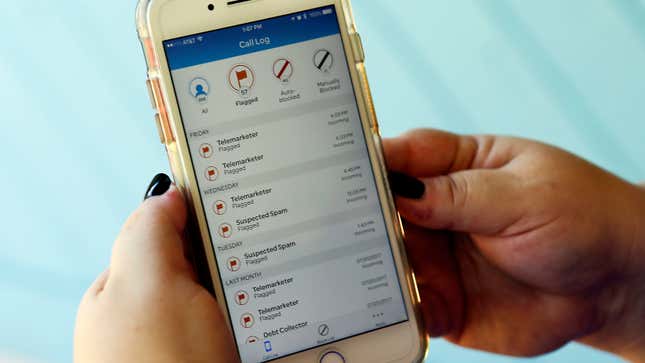
As automated Voice over Internet Protocol (VoIP) systems fueled a national robocall epidemic estimated at tens of billions of bogus calls annually, the Federal Trade Commission and the Federal Communications Commission argued over who should actually do something about it, according to a Sunday report in the Wall Street Journal.
“Relatively few” of the calls that are “flagged as ‘high risk’ of being illegal robocalls” originate from big, national telecoms, the Journal wrote—though that vague figure comes courtesy of USTelecom, a telecom industry trade association. Instead, industry officials told the paper, small companies that facilitate Voice over Internet Protocol (VoIP) services and do little to prevent abuse have played a disproportionate role in enabling mass robocalls.
The Journal wrote that because these services are small and use the same technology used to place legitimate robocalls—say, school closures—they have largely avoided scrutiny. (Eight different firms, including one that connects call centers in the Philippines to U.S. phone lines, acknowledged to the paper that they had received inquiries from a USTelecom effort to trace robocalls back to their source.) Meanwhile, regulators in the U.S. have fought over who is actually responsible for cracking down.
According to the Journal’s report, both the FTC and the FCC have claimed that the other has jurisdiction over abuse of VoIP systems. An FCC spokesperson told the paper that the agency has limited authority over such providers, specifically noting that one-way carriers which help place calls but don’t receive them fall outside certain regulatory restrictions. Meanwhile, the FTC has punted back to the FCC, the Journal wrote:
The FTC has broad authority to go after deceptive business practices, but the agency believes some robocall intermediaries, including VoIP providers, fall outside its jurisdiction. In a recent memo to a congressional committee, viewed by the Journal, the FTC cites a May 2018 enforcement action related to scam callers where it declined to sue an internet-based phone company “for its knowing participation in the illegal robocalls.”
The FTC memo pointed the finger at the FCC, saying the company in question was likely a “common carrier” exclusively under the jurisdiction of the FCC.
An FCC spokesman declined to discuss specific enforcement cases but disputed the FTC’s legal interpretation, saying the FTC has broad authority to go after both robocallers and “middlemen that facilitate them.”
Great.
While FCC chairman Ajit Pai recently pushed through a vote to allow carriers to automatically block illegal or unwanted robocalls before they reach customers, Democratic FCC commissioner Jessica Rosenworcel noted that the agency does not require carriers to implement such technology or offer it for free.
As the Washington Post reported, consumer groups had urged the FCC to instead opt for a more sweeping overhaul of the nation’s anti-robocalling laws. The National Consumer Law Center and the Consumers Union wrote in a letter to the FCC last year that the agency should require voice providers implement caller ID verification system and automatically block suspicious calls without charge to consumers, including those “originating internationally as well as domestically.”
Several major carriers, however, have begun rolling out their own systems designed to fight caller ID spoofing which makes it seem as though calls originate from a local area code. The FTC also announced it had shut down four major robocalling operations, including ones promoting fake charities and other scams, earlier this year.